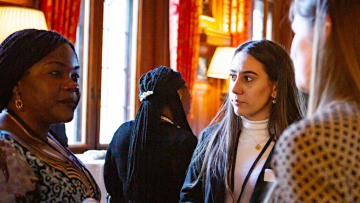The Best Kept Secret of the Catholic Church

Chris, our 2021-2022 CAFOD intern offers his personal reflections on Catholic Social Teaching and how he has seen it work in practice through his experiences within and outside of his placement
We began our internship by being introduced to the ‘best kept secret of the Catholic Church’ by Father Ashley Beck from St Mary’s Twickenham. Catholic Social Teaching (CST) challenges us to build ‘a just society and live lives of holiness amidst the challenges of modern society’. The Bishops’ Conference of England and Wales’ 1997 document, The Common Good, reminds Catholics that ‘nothing is beyond the scope of faith’.
Over the last few months, we have had the privilege to meet a whole range of Catholic organisations, charities and academics who are responding actively to this social mission of the Church.
The Compendium of the Social Doctrine of the Church reminds us of our duty to ‘embrace’ the ‘hungry, the needy, the homeless, those without health care and, above all, those without hope of a better future’. We saw this at the Cardinal Hume Centre, which provides support for those suffering from and at risk of homelessness, in one of the UK’s wealthiest local authorities, Westminster. Stella Maris similarly offers hope to seafarers at ports in the UK who are often at the mercy of the immigration system and the whims of multinational shipping companies. MISSIO takes this mission overseas enabling Catholics in the UK to support the ‘young Church through prayer, charity and information’. I see this also on my own placement, at CAFOD, where that preferential treatment for the poor is lived out, noting especially the recent focus of CST which calls us to ‘protect our common home’.
Over the last few months, we have had the privilege to meet a whole range of Catholic organisations, charities and academics who are responding actively to this social mission of the Church.
Responding to the challenges of CST, is not exclusively a question of practical support but also of ideas. We met with Jenny Sinclair from the charity, Together for the Common Good. She explained how they seek to bring CST to the people of God and enable the faithful to understand better the social crises facing our country and world today. Similarly, Phillip Booth from the Institute of Economic Affairs explained how CST shaped his understanding of economics. Personally, I was challenged by our discussion around the CST principle of subsidiarity which claims there should be limits to state intervention. However, I have come to better understand how some hold this perspective. Through our experiences meeting grassroots organisations, I have seen how they serve vulnerable communities and understand them in a way government agencies never could.
I am so grateful for the time different individuals have given to explain CST to us and how it underpins their work and lives.
At CAFOD, I also see how CST underpins our work. I am currently working on a campaign inspired by Pope Francis’ call in Laudato Si’ for greater corporate responsibility through legislation.
I am so grateful for the time different individuals have given to explain CST to us and how it underpins their work and lives. However, this privilege is also a challenge as we discern how we are called to live out Catholic Social Teaching in our placements and beyond the internship. Pray for us as we do this.



